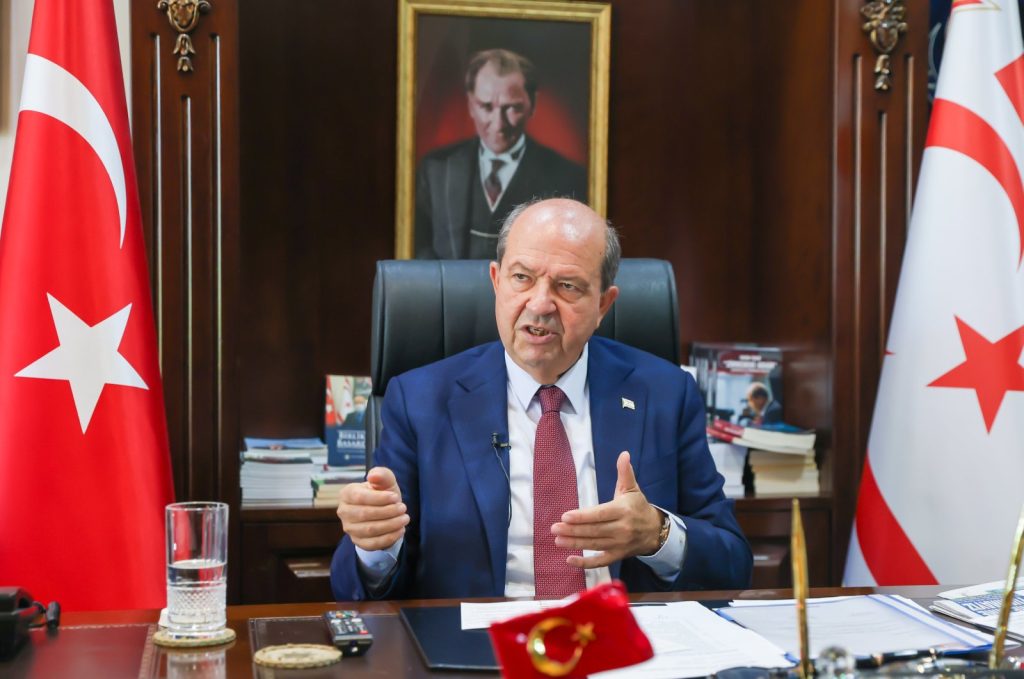For decades, Cyprus has been trapped in a stagnant geopolitical saga – same actors, same plot, same futile hope for a different outcome. But in 2024, Ersin Tatar, president of the Turkish Republic of Northern Cyprus (TRNC), stepped into the spotlight at the United Nations General Assembly (UNGA) in New York with a message that cuts through the fog of failed diplomacy: two states, two peoples and no more talk of federal fantasies.
In a series of blunt public statements, particularly after the recent informal meeting with Greek Cypriot administration leader Nikos Christodoulides, Tatar made it clear – sovereign equality isn’t a request; it’s a demand. He declared that future peace talks must recognize the Turkish Cypriots’ right to equal international status and sovereignty. This is more than a shift in rhetoric – it’s a complete departure from the worn-out federalist solutions the international community still clings to.
Vision forged in betrayal
While Tatar’s stance may seem audacious, it stems from a deep sense of betrayal. In 2004, the dream of a federal solution was crushed when Greek Cypriots overwhelmingly rejected the Annan Plan, a peace proposal embraced by Turkish Cypriots. This wasn’t just a setback – it was the death knell for any hope of federal unity. Years of failed negotiations, most notably the much-vaunted Crans-Montana talks in 2017, exposed the federal solution as a political corpse – irrelevant, decayed and unfit for the future.
Tatar’s recent defiance, particularly in his 2024 interactions with Christodoulides, underscores a fundamental truth: he has no interest in rehearsing past failures. At their meeting in New York, Tatar reiterated that future negotiations won’t entertain federalism; they’ll start and end with recognizing TRNC sovereignty.
This isn’t posturing – it’s survival. Turkish Cypriots, marginalized and politically abandoned since the violence of 1963’s “Bloody Christmas,” were expelled from the shared government and left in the cold while the international community, through U.N. Resolution 186, inexplicably anointed the Greek Cypriot regime as the sole legitimate authority. Turkish Cypriots have lived in this diplomatic limbo for nearly 60 years, and Tatar’s message is simple: enough is enough.
Strategic gamble?
At the core of Tatar’s approach lies the principle of “sovereign equality” – a concept dismissed by some as radical but viewed by others as the only realistic path forward. “The chapter on federation is closed,” Tatar declared, and he’s right. Cyprus’ federalist dreams have become political ghosts, haunting negotiations with promises that will never be fulfilled.
But does Tatar’s vision truly offer a viable solution, or is it merely a step toward permanent division? In fact, this question is not just about Cyprus – it’s part of a broader global struggle over sovereignty from Catalonia to Scotland. The question isn’t just whether Cyprus can survive as two states; it’s whether the world can accept the erosion of federalist unity in favor of sovereign identity.
And Tatar knows his timing is impeccable. As global borders harden and federal solutions falter, his push for sovereign equality taps into an emerging trend. Even his symbolic olive branch – an informal dinner with Christodoulides – came with firm terms: sovereign equality, not reunification. It’s a stance rooted in recognizing that federalism is an outdated relic in today’s fractured geopolitical landscape.
Economic suffocation
For Turkish Cypriots, Tatar’s vision is not just a political move – it’s about economic survival. The TRNC has been economically suffocated by international embargoes, upheld for decades by the Greek Cypriot leadership’s insistence. This isolation has left Northern Cyprus heavily dependent on Türkiye, barred from global markets and starved of international investment.
Tatar has been unequivocal about the human cost of these sanctions, highlighting how Turkish Cypriot investors and their foreign partners face legal threats and intimidation from Greek Cypriot authorities. The example of a foreign company facing severe repercussions for investing in the TRNC sent a chilling message: invest in Northern Cyprus, and you invite trouble.
During his New York visits, Tatar reiterated that these embargoes are both unjust and unsustainable. They serve no real diplomatic purpose and instead punish the very people they claim to protect. The world must ask itself: is economic isolation still an effective political tool in a hyper-connected global economy? In Tatar’s view, these sanctions do nothing but reinforce a stagnant status quo.
In crosshairs of global power
Also, Cyprus is no longer a footnote in international politics. With the discovery of energy resources in the Eastern Mediterranean, the island has become a flashpoint in regional power dynamics. Türkiye’s role as an assertive regional player, particularly in the energy sector, has amplified the stakes. Tatar’s insistence on sovereign equality isn’t just about recognition – it’s about ensuring Northern Cyprus has a say in the region’s future, especially as Mediterranean energy reserves redraw the lines of power.
Türkiye, emboldened by its strategic ambitions, has backed Tatar’s push for sovereignty, knowing well that this isn’t just about a frozen conflict. It’s about positioning Northern Cyprus as an active player in a rapidly evolving geopolitical game.
New voice, new consensus
Tatar’s vision gained further traction when Özgür Özel, chairperson of Türkiye’s main opposition Republican People’s Party (CHP), publicly endorsed the two-state solution at the recent Socialist International conference. This marked a shift in the CHP’s traditionally cautious stance on Cyprus and thus in Turkish domestic politics, signaling growing consensus around Tatar’s way. Cyprus is no longer a peripheral issue in Turkish politics – it’s central to the country’s geopolitical agenda. With this broader support, Tatar’s hand is strengthened, both domestically and on the international stage.
End of chess game
The time for tired political maneuvers is over. The dream of a federal solution in Cyprus is dead, and a new era of sovereign equality is emerging. Turkish Cypriots will no longer wait for recognition – they demand it. The international community now faces a choice: cling to the ghost of reunification or accept the reality of two states.
Tatar’s vision is clear: Turkish Cypriots will no longer sit on the sidelines. The chess game of the past is over. Cyprus’s future lies not in outdated notions of unity but in sovereign equality – a reflection of the new geopolitical realities shaping the 21st century.

